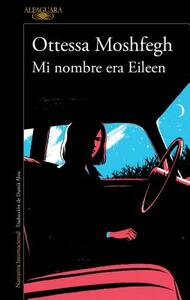Take a photo of a barcode or cover
dark
slow-paced
Plot or Character Driven:
Plot
Strong character development:
No
Loveable characters:
No
Diverse cast of characters:
No
Flaws of characters a main focus:
Yes
medium-paced
Idk I feel like I’m over trying Ottessa Moshfegh - this is my third try and while I think Eileen is better than Lapvona or My Year of rest and relaxation I just do not like the way she writes
mysterious
reflective
tense
medium-paced
The way i love unhinged female characters xxx (what she felt for Randy i can feel on a healthy level a crush u never talk to is self torture in a way)
dark
mysterious
slow-paced
adventurous
funny
reflective
tense
medium-paced
Plot or Character Driven:
A mix
Strong character development:
No
Loveable characters:
Complicated
Diverse cast of characters:
Complicated
Flaws of characters a main focus:
Yes
dark
emotional
mysterious
tense
medium-paced
Plot or Character Driven:
Character
Strong character development:
Yes
Loveable characters:
No
Diverse cast of characters:
Yes
Flaws of characters a main focus:
Yes
Eh
a long, slow suffocation with a grimy pillow, Eileen is unremittingly bleak. you can almost smell this book—it is fetid and distinctly uncomfortable in a prickly, proud way, like when you come in from shoveling snow for hours, sweaty and hot and damp and all your clothes are pinching you in all the wrong ways, and you can't get them to settle right on your body no matter what you do. kind of like if you dipped Patricia Highsmith in liquid crud, then left her outside overnight to freeze solid—compared to the prim and proper study of psychosexual repression that is "The Price of Salt," this is the gross, stunted cousin that goes around drooling on everyone, hasn't bathed in weeks, and keeps ogling you with a dull, glassy disinterest bordering on lust.
all that being said, I didn't hate this. I felt mildly impatient in the beginning—the titular character's object of obsession doesn't show up until nearly halfway through the book, and I found the passive, self-effacing voice distinctly off-putting, but not enough that I wanted to stop. the conclusion blindsided me, which I found very intriguing—Moshfegh deliberately introduces a literal Chekov's Gun, even pointing out the reason for including it "as part of the scene," but then cheekily dismantles expectations. I could see how this might be off-putting for some who have become used to such things, but I found myself grinning at the blatant disregard for established literary convention.
oddly enough, the book announces itself (in many ways) as a tragedy, setting the scene for what feels like a sorrowful denouement, and yet Moshfegh disobeys this expectation, too, by book's end. though can it really be called an awakening if one is only progressing from nightmare to a slightly different shade of dreaming?
immersive in the worst way (like wallowing in a cesspit), I think I'll be considering this book for a long time to come, though I'm not sure I'll be able to recommend it to many other readers—it fits in a distinctly abject (by way of Kristeva) niche of books that insistently poke and prod at your brain, reminding you that you, too, are but stinking flesh and decomposing by increments: a loosely-tied bundle of sodden addictions and ingrown thoughts, and no matter how much you pick and scratch and itch, there's always something weeping.
all that being said, I didn't hate this. I felt mildly impatient in the beginning—the titular character's object of obsession doesn't show up until nearly halfway through the book, and I found the passive, self-effacing voice distinctly off-putting, but not enough that I wanted to stop. the conclusion blindsided me, which I found very intriguing—Moshfegh deliberately introduces a literal Chekov's Gun, even pointing out the reason for including it "as part of the scene," but then cheekily dismantles expectations. I could see how this might be off-putting for some who have become used to such things, but I found myself grinning at the blatant disregard for established literary convention.
oddly enough, the book announces itself (in many ways) as a tragedy, setting the scene for what feels like a sorrowful denouement, and yet Moshfegh disobeys this expectation, too, by book's end. though can it really be called an awakening if one is only progressing from nightmare to a slightly different shade of dreaming?
immersive in the worst way (like wallowing in a cesspit), I think I'll be considering this book for a long time to come, though I'm not sure I'll be able to recommend it to many other readers—it fits in a distinctly abject (by way of Kristeva) niche of books that insistently poke and prod at your brain, reminding you that you, too, are but stinking flesh and decomposing by increments: a loosely-tied bundle of sodden addictions and ingrown thoughts, and no matter how much you pick and scratch and itch, there's always something weeping.
dark
mysterious
tense
slow-paced
Plot or Character Driven:
A mix
Strong character development:
Complicated
Loveable characters:
No





